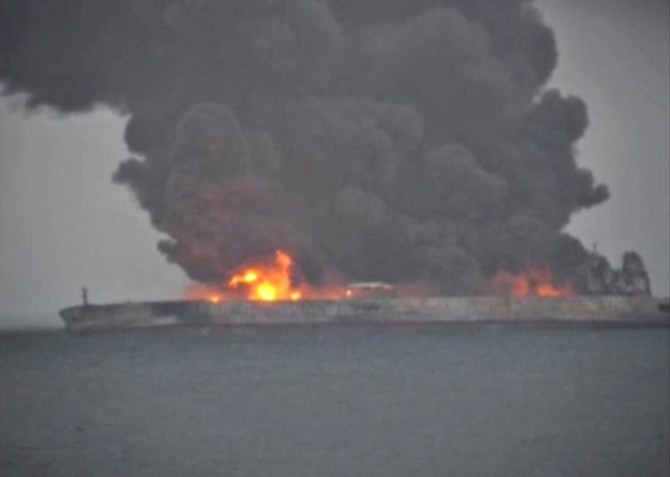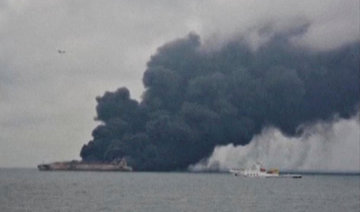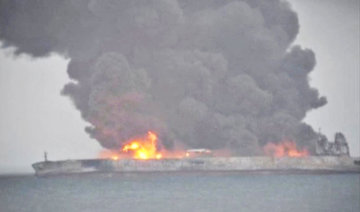BEIJING: Lashing winds, high waves and toxic gases are hindering dozens of rescue boats struggling to locate missing sailors from a stricken oil tanker in the East China Sea and to extinguish a fire that has burned for the past three days on the ship.
The poor conditions, with strong winds, rain and waves as high as 3 meters (10 feet), frustrated efforts to tame the fire and search for the 31 remaining tanker crewmen, the Ministry of Transport said in a statement on Tuesday.
The flames were forcing the South Korean Coast Guard’s search and rescue team to stay as far as 3 miles (4.8 km) away from the tanker, two South Korean officials told Reuters.
The body of a crewman was found on Monday in the water near the tanker, China’s Transport Ministry said. It had been handed over to the civil affairs bureau.
Concerns were growing that the tanker may explode and sink while a flotilla of 13 search and rescue vessels comb a 900-square-nautical-mile (3,100 sq. km) area around the ship for the crew. The tanker hit a freight ship on Saturday night in the East China Sea, burst into flames and has been spilling oil.
The tanker Sanchi, run by Iran’s top oil shipping operator, National Iranian Tanker Co., collided with the CF Crystal, carrying grain from the US, about 160 nautical miles (300 km) off China’s coast near Shanghai and the mouth of the Yangtze River Delta.
The Sanchi was carrying 136,000 tons of condensate, an ultra-light crude oil that becomes highly volatile when exposed to air and water, to South Korea.
The size of the oil spill from the ship and the extent of the environmental harm were not known, but the disaster has the potential to be the worst since 1991 when 260,000 tons of oil leaked off the Angolan coast.
“We can’t grasp the level of oil contamination at this moment. The cargo is still on fire, so it is hard to figure out if oil is being spilled,” Park Sung-dong, an official from South Korea’s Ministry of Oceans and Fisheries, told Reuters.
Chinese state media CCTV showed footage on Monday of boats dousing the flames with water as plumes of thick dark smoke continued to billow from the tanker.
The crew of the Sanchi are all Iranian nationals except for two Bangladeshi citizens. The CF Crystal suffered limited damage and the 21 crewmen, all Chinese nationals, were rescued.
The freighter has been taken to a port near Shanghai where investigators will start work on assessing the cause of the disaster.
China’s Transport Ministry warned that toxic gas from the tanker was harmful to the rescue workers and that protective clothing and gas testing equipment was being dispatched to the emergency teams.
When condensate meets water, it evaporates quickly and can cause a large-scale explosion as it reacts with air and turns into a flammable gas, the ministry said on Monday.
Trying to contain a spill of condensate, which is extremely low in density, highly toxic and much more explosive than normal crude oil, may be difficult.
Iranian oil tanker burns for 3rd day as winds, high waves lash rescuers
Iranian oil tanker burns for 3rd day as winds, high waves lash rescuers

‘Tidal wave of Islamophobia’ in UK, says outgoing MCB chief

- Zara Mohammed’s 4-year tenure involved responses to nationwide rioting, COVID-19 pandemic
- ‘There has been such a normalization of Islamophobic rhetoric without it being challenged or condemned,’ she tells BBC
LONDON: The UK is suffering from a “tidal wave of Islamophobia,” the outgoing leader of one of the country’s largest Muslim bodies has warned.
Zara Mohammed has served as the first female leader of the Muslim Council of Britain since 2021, and through her tenure tackled nationwide riots last year, the COVID-19 pandemic, and being frozen out of government contact.
Ahead of her departure as MCB general secretary on Saturday, Mohammed spoke to the BBC about the difficulties she has faced over the last four years.
“It was the Southport riots for us that made it really quite alarming,” she said, referring to nationwide disorder last year in the wake of a stabbing attack in Southport.
“It was so visceral. We were watching on our screens: People breaking doors down, stopping cars, attacking taxi drivers, smashing windows, smashing mosques,” she told the BBC. “The kind of evil we saw was really terrifying and I felt like, am I even making a difference?”
The rioting was partly triggered by false online rumors that the attacker was a Muslim asylum-seeker.
Yet the government at the time had refused to engage with Mohammed, and the largest umbrella Muslim organization in Britain “wasn’t being talked to,” she said.
“The justification was there, the urgency, the necessity of engagement was there, British Muslims were under attack, mosques were under attack.”
In the year since the war in Gaza began, monitoring group Tell Mama UK recorded 4,971 instances of Islamophobic hate in Britain — the highest figure in 14 years.
The MCB had done “a lot of community building and political advocacy” in a bid to tackle the problem, yet this had failed to shift mainstream narratives surrounding British Muslims, Mohammed said.
“There has been such a normalization of Islamophobic rhetoric without it being challenged or condemned,” she added.
“We could say we’re making a difference but then what is being seen in national discourse does not seem to translate.”
Abuse of Muslim politicians across the UK, including former Scottish First Minister Humza Yousaf and London Mayor Sadiq Khan, demonstrates a broader trend of rising Islamophobia, Mohammed said.
“You’re constantly firefighting. Did we make British Muslims’ lives better? On one hand, yes, because we raised these issues, we took them to a national platform. But with Islamophobia, we’re still having the same conversation,” she added.
“We still haven’t been able to break through, whether it’s government engagement, Islamophobia or social mobility.”
Pakistan ex-PM Imran Khan, wife appeal graft convictions: lawyer

- Imran Khan was sentenced to 14 years and his wife to seven earlier this month
- A special graft court found the pair guilty of ‘corruption and corrupt practices’
ISLAMABAD: Pakistan’s jailed former prime minister Imran Khan and his wife Bushra Bibi on Monday appealed their convictions for graft, his lawyer said.
Khan was sentenced to 14 years and his wife to seven earlier this month in the latest case to be brought against them.
“We have filed appeals today and in the next few days it will go through clerical processes and then it will be fixed for a hearing,” Khan’s lawyer Khalid Yousaf Chaudhry said.
The papers were filed at the Islamabad High Court.
A special graft court found the pair guilty of “corruption and corrupt practices” over a welfare foundation they established together called the Al-Qadir Trust.
Khan, 72, has been held in custody since August 2023 charged in around 200 cases which he claims are politically motivated.
Kremlin says it has yet to hear from US about a possible Putin-Trump meeting

MOSCOW: The Kremlin said on Monday it had yet to receive any signals from the United States about arranging a possible meeting between President Vladimir Putin and President Donald Trump, but remained ready to organize such an encounter.
Kremlin spokesman Dmitry Peskov said it appeared a “certain amount of time” was needed before a meeting between the two leaders could take place. He said Russia understood that Washington was still interested in organizing such a meeting.
Putin said on Friday that he and Trump should meet to talk about the Ukraine war and energy prices, issues that the US president has highlighted in the first days of his new administration.
India minister pledges to evict ‘illegal’ immigrants from capital

NEW DELHI: Indian Prime Minister Narendra Modi’s closest political ally has pledged to rid the capital of “illegal’ immigrants if his party wins looming elections, in a forceful appeal to his party’s Hindu constituency.
Interior minister Amit Shah said every unlawful migrant from neighboring Bangladesh would be expelled from New Delhi “within two years” if his party succeeded in next month’s provincial polls.
“The current state government is giving space to illegal Bangladeshis and Rohingyas,” Shah told an audience of several thousand at Sunday’s rally.
“Change the government and we will rid Delhi of all illegals.”
India shares a porous border stretching thousands of kilometers with Muslim-majority Bangladesh, and illegal migration from its eastern neighbor has been a hot-button political issue for decades.
There are no reliable estimates of the number of Bangladeshis living illegally in Delhi, a city to which millions have flocked in search of employment from elsewhere in India over recent decades.
Critics of Modi and Shah’s Bharatiya Janata Party (BJP) accuse the party of using the issue as a dog whistle against Muslims to galvanize its Hindu-nationalist support base during elections.
Delhi, a sprawling megacity home to more than 30 million people, has been governed for most of the past decade by charismatic chief minister Arvind Kejriwal and his Aam Aadmi Party (AAP).
Kejriwal rode to power as an anti-corruption crusader a decade ago and his profile has bestowed upon him the mantle of one of the chief rivals to Modi and Shah’s party.
His popularity has been burnished by extensive water and electricity subsidies for the capital’s millions of poorer residents.
But he spent several months behind bars last year on accusations his party took kickbacks in exchange for liquor licenses, along with several fellow party leaders.
Kejriwal denies wrongdoing and characterised the charges as a political witch-hunt by Modi’s government, and despite resigning as chief minister last year vowed to return to the office if his party won re-election.
The BJP has led a spirited campaign in its efforts to dislodge Kejriwal’s party ahead of the February 5 vote.
Modi is expected to make a pilgrimage to the ongoing Kumbh Mela, the biggest festival on the Hindu calendar, to bathe in the sacred Ganges river on the day of the Delhi assembly vote.
Results of the election will be published on February 8.
Ukraine’s Zelensky urges action against ‘evil’ on Auschwitz anniversary

- The Kremlin launched its invasion of Ukraine in February 2022
- Zelensky warned that the memory of the Holocaust is growing weaker
KYIV : Ukrainian President Volodymyr Zelensky on Monday said the world must unite against evil, in comments marking the 80th anniversary of the liberation of the Auschwitz Nazi death.
The Kremlin launched its invasion of Ukraine in February 2022 claiming that the government in Kyiv contained neo-Nazi elements and saying the country must be demilitarized.
Zelensky warned that the memory of the Holocaust is growing weaker and said some countries are still trying to destroy entire nations.
“We must overcome the hatred that gives rise to abuse and murder. We must prevent forgetfulness,” he said, according to a statement from the presidency.
“And it is everyone’s mission to do everything possible to prevent evil from winning,” he added.
The foreign ministry said in a statement that Russia’s invasion “brought back to Ukrainian soil horrors that Europe has not seen since World War II.”
“Jewish communities of Ukraine are also suffering from constant Russian terror, in particular in the cities of Dnipro and Odesa, which have a population of over a million, and other localities,” it added.
The Holocaust decimated the Jewish community in Ukraine, which during World War II was part of the Soviet Union.
It was not the first massacre of Jewish people in Ukraine’s history, which had seen previous anti-Semitic pogroms.

















